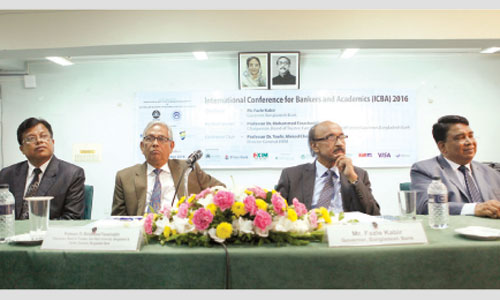Defaulted loans fail banks to lower interest rate
Experts and economists on Sunday said the country’s banks were now unable to lower their interest rates as they (banks) have been under heavy burden of defaulted loans in recent years.
They came up with the opinion at the International Conferences for Bankers and Academics 2016 jointly organised by Bangladesh Institute of Bank Management and Australian Academy of Business and Social Science.
The two-day conference began at the BIBM auditorium in the capital where local and global experts are scheduled to deliver speeches in 13 sessions.
Former Bangladesh Bank governor Mohammed Farashuddin presented keynote paper at the inaugural session of the conference.
He said Bangladesh has an expanding banking sector which despite some problems like a growing default culture, inadequate accountability system and non optimal transparency has served the economy rather well.
‘Of course, the country’s situation in the banking sector should be better,’ he said.
If and when the appropriate reforms including a boldly implemented regulatory system is put in place, the greater use of the technology will add definite strength to the productivity and growth of the Bangladesh economy, the former BB governor said.
Bangladesh has performed poorly in attracting foreign direct investment, he said.
On paper, the country offers a very liberal and attractive policy to encourage the foreign investors like moratorium against nationalisation, freedom to repatriate principle, profit and tax concession, he said.
Yet, out of the $1,800 billion or so of annual FDI flows across the globe, Bangladesh did not succeed in attracting higher level of FDI during and following the financial crisis years as the country attracted only $2 billion FDI, Farashuddin said.
Inability to present attractive projects, unease about political developments as well as high cost of doing business are some of the factors that warrant immediate attention, he pointed out.
BB governor Fazle Kabir said that the central bank had instituted wide-ranging reforms of methods and procedures to exercise heightened surveillance over the banks and financial institutions.
Risk management and corporate governance practices of banks have been brought under closer supervisory scrutiny to arrest the increasing incidence of non-performing loans, he said.
Stress testing exercises are now routine practices in Bangladesh as diagnostic and supervisory tools, the BB governor said.
In a separate session on banking, BB deputy governor SK Sur Chowdhury said that the huge amount of defaulted loans in the banking sector created a hindrance to decreasing the interest spread rate.
He said the mindset of bank management has always been an important determinant of interest rate spread.
BB researchers Sayera Younus and Akhtaruzzaman jointly presented a paper on Determinants of Bank Interest Spread in Bangladesh at the session.
They said that the non-performing loan appeared to be one of the good reasons for having higher interest spread in Bangladesh.
‘Classified loans turn out to be significant for both state-owned commercial banks and specialised banks that implies that NPLs are one of the driving force behind higher spread in the SCBs and SBs,’ according to their research work.
Classified loans do not seem to be matter either for private and foreign commercial banks, they said.
‘PCBs also take into account inflation while calculating spread. The coefficient of CRR is significant at 1 per cent level for all groups of banks, however, it is significant and negative for the PCBs,’ they said.
The coefficient of National Savings Directorate is also significant and positive for SCBs, SBs and PCBs implying that NSD certificate rate is one of the major reasons for a higher spread in the banks, they said.
News Courtesy: www.newagebd.net











